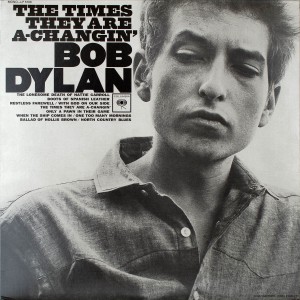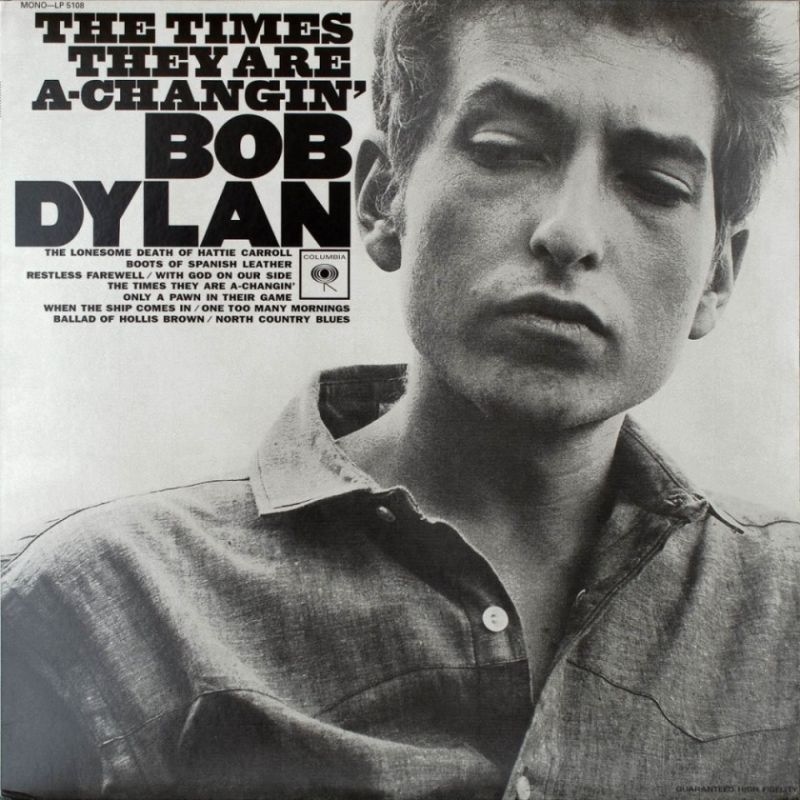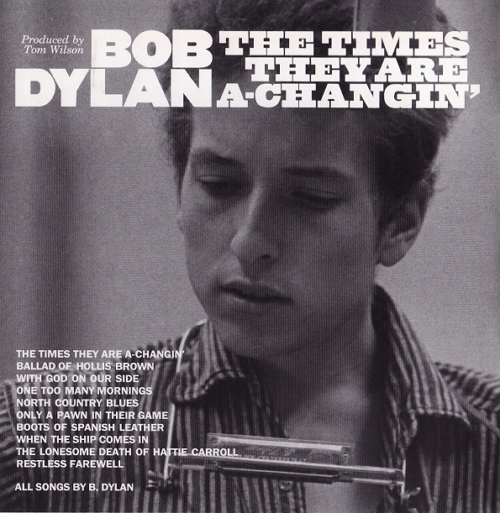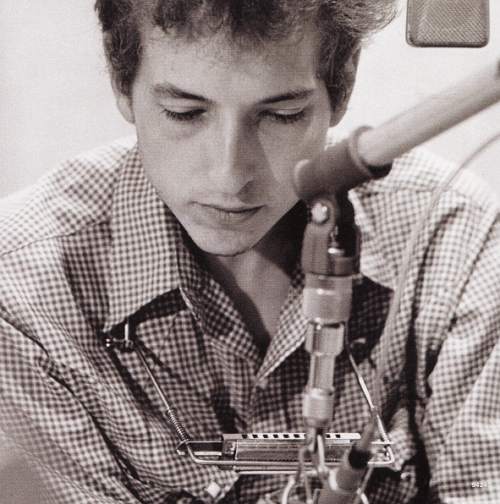“The message isn’t in the words, …. I don’t do anything with a sort of message.
I’m just transferring my thoughts into music. Nobody can give you a message like that.”
~Bob Dylan (to Ray Coleman, May 1965)Dylan’s third album reflects his mood in August-October 1963. It is also a product for his need to live up to and expand on the role he found himself in, topical poet, the restless young man with something to say, singing to and for a new generation.
~Paul Williams (BD performing artist 1960-73)
Released January 13, 1964 – 50 years ago today… it is one of his weakest albums from the 60’s.. and still a fantastic album.
“The Times They Are A-Changin'” @ The White House in Feb 2010:
The Lonesome Death Of Hattie Carroll @ Toronto, Ontario, Canada – 1 February 1964:
…
Oh, but you who philosophize disgrace and criticize all fears
Bury the rag deep in your face
For now’s the time for your tears
(The Lonesome Death of Hattie Carroll)The story I took out of the newspaper and I only changed the words.
~Bob Dylan (to Steve Allen, Feb 1964)
From Wikipedia:
| Released | January 13, 1964 |
|---|---|
| Recorded | August 6 – October 31, 1963 at Columbia Studios, New York City |
| Genre | Folk |
| Length | 36:00 |
| Label | Columbia |
| Producer | Tom Wilson |
The Times They Are a-Changin’ is the third studio album by American singer-songwriter Bob Dylan, released in January 1964 by Columbia Records.
Produced by Tom Wilson, it is the singer-songwriter’s first collection to feature only original compositions. The album consists mostly of stark, sparsely-arranged ballads concerning issues such as racism, poverty, and social change. The title track is one of Dylan’s most famous; many felt that it captured the spirit of social and political upheaval that characterized the 1960s.
Some critics and fans were not quite as taken with the album as a whole, relative to his previous work, for its lack of humor or musical diversity. Still, The Times They Are a-Changin’ entered the US chart at #20, eventually going gold, and belatedly reaching #4 in the UK in 1965.
Recording sessions
Dylan began work on his third album on August 6, 1963, at Columbia’s Studio A in New York City. Once again, Tom Wilson was the producer for the entire album. Dylan had, by the time of recording, become a popular, influential cultural figure.
There were to be 6 recording sessions for The Times They Are a-Changin’, I have posted 2 articles earlier about the 4th & the 5th recording session:
- 7 August 1963: The 2nd The Times They Are A-Changin’ recording session
- Bob Dylan – The 4th recording session for “The Times They Are A-Changin’” – 23 October 1963
- Bob Dylan – The 5th recording session for “The Times They Are A-Changin’” – 24 October 1963
For facts about the other sessions – check out “Still On The Road”
With God on Our Side – BBC Tonight Show (1964):
If The Times They Are a-Changin’ isn’t a marked step forward from The Freewheelin’ Bob Dylan, even if it is his first collection of all originals, it’s nevertheless a fine collection all the same. It isn’t as rich as Freewheelin’, and Dylan has tempered his sense of humor considerably, choosing to concentrate on social protests in the style of “Blowin’ in the Wind.” With the title track, he wrote an anthem that nearly equaled that song, and “With God on Our Side” and “Only a Pawn in Their Game” are nearly as good, while “Ballad of Hollis Brown” and “The Lonesome Death of Hattie Carroll” are remarkably skilled re-castings of contemporary tales of injustice. His absurdity is missed, but he makes up for it with the wonderful “One Too Many Mornings” and “Boots of Spanish Leather,” two lovely classics. If there are a couple of songs that don’t achieve the level of the aforementioned songs, that speaks more to the quality of those songs than the weakness of the remainder of the record. And that’s also true of the album itself — yes, it pales next to its predecessor, but it’s terrific by any other standard.
~Stephen Thomas Erlewine (allmusic.com)
Only a Pawn in Their Game – Newport 1963:
Track listing:
All songs written by Bob Dylan.
- Side one
- “The Times They Are a-Changin'” – 3:15
- “Ballad of Hollis Brown” – 5:06
- “With God on Our Side” – 7:08
- “One Too Many Mornings” – 2:41
- “North Country Blues” – 4:35
- Side two
- “Only a Pawn in Their Game” – 3:33
- “Boots of Spanish Leather” – 4:40
- “When the Ship Comes In” – 3:18
- “The Lonesome Death of Hattie Carroll” – 5:48
- “Restless Farewell” – 5:32
—
My ratings:
- The Times They Are A-Changin’ – 9,5 (0-10)
- The Lonesome Death of Hattie Carroll – 9,5
- With God On Our Side – 9
- When the ship comes in – 9
- North Country Blues Bob Dylan – 8,5
- Only a Pawn in Their Game – 8
- Boots of Spanish Leather – 7,5
- One Too Many Mornings – 7,5
- Ballad of Hollis Brown – 7,5
- Restless Farewell – 7
—
North Country Blues – Newport 1963:
Personnel
- Bob Dylan – vocals, acoustic guitar, harmonica
- Technical personnel
- Tom Wilson – production
-Egil







Actually this was my first introductory LP to Bob Dylan ( it was late in the 1960s ), it was ideally suited to seriously pay attention to the lyrics and reflect upon them in one’s own capacity, all this nicely aided by smoking good joints in company of good friends. Many songs from this LP became popular in the few dens that we frequented, the place was dim-lit and generally filled with pin-drop silence as the numbers were played loud. Some went on to the dance floor and moved themselves about, they were absolutely stoned, of course, like most of us all. Some of these young males and females were the original hippies or flower children on the drift. All that I’m saying here happened in Bombay, India. A few months later, we got hold of the earlier “Freewheelin’ Dylan” LP, enjoyed it song by song, and all the humour. It was different, that’s all. Each and every subsequent Dylan LP released has been so, vive la difference, viva Dylan.
North Country Blues is one song that strikes me hard…still….
Here is a blogspot about it
http://everybobdylansong.blogspot.nl/2008/09/bob-dylan-song-31-north-country-blues.htmlq
And the documentary he is talking about is here
http://youtu.be/iUJCKq5o74c
I am curiuous about who said that it is one if his weakest albums from the sixties but still a fantastic album…Not that I share this opinion but I would like to know .
Hi Hilda.. That was me talking.
Of the 9 albums Dylan released in the sixties, I only rate the debut “Bob Dylan” (still a very good album) and “Nashville Skyline” lower.
That said all nine are very good to Exceptional…. two of them being the two best albums ever made 🙂
-Egil
Thanks Egil….I don’t rate albums ; it depends on my mood which one I like on a given day…:-)
Thanks again for an insightful article about a Dylan album. What baffles me though is that you go along with those that in hindsight diminish the stature of The Times, mostly by comparing it to Freewheelin and pointing out the lack of humor. Yet, as a whole I would say it has much more of an atmosphere, and this would have been damaged by including yet another vaudeville talking blues. Okay, it is stark and therefore you really have to open up for it, cause it sinks deep and you may not always be prone to that. Also, it is clear that it constitutes a frame from which Dylan could only choose to walk away from, if he wanted to maintain his artistic growth. But what a frame it is! Containig the strongest images, and his guitar playing is impressive. And you can tell by the way you rank most of the songs, pretty high. By the way, I don’t see any filler as on Freewheelin and the historical more prominent Another Side. I for one cannot understand you give two of the loveliest and intense lovesongs he ever wrote, namely Spannish Boots and One too Many Mornings, such low figures, and they do deliver some variety. Restless Farewell, I have always been impressed by it and lately I had to sing it for a friend who is dying and the impact of it blew us away, but I have to admit that it I can understand that some are not so impressed by it and would have preferred Lay Down Your Weary Tune or the brilliant Tomorrow is a Long Time. Which brings me to another argument: Looking at all the beautiful outtakes one can only say that he was on the height of his folk power, still he had to move on. And, to conclude, of course it is a matter of taste, but back in the days this record was the one that won most people over back here in Europe, most of us learned of the presence of The Troubadour through this record…